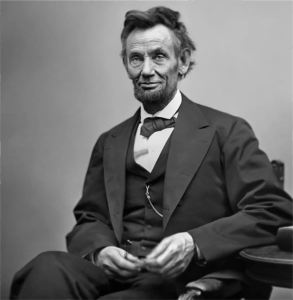Abraham Lincoln and the Three Rs
Reading, Writing, and…Remedy
By Steve Hooley

Today is Lincoln’s birthday. He was born on 2/12/1809, 213 years ago. Ten score and thirteen years ago.
“Writing—the art of communicating thoughts to the mind, through the eye—is the great invention of the world.” (Abraham Lincoln)
Lincoln is known for his voracious reading, his tenacious will to learn and overcome his single year of formal education, and his eloquent prose, both written and spoken. I thought that in honor of our 16th president and his 213th birthday, it would be a good day to be inspired by his reading and writing remedy plan.
Below are some of the key paragraphs in an article in Harvard University Press, 2/12/2019 on Lincoln and his reading and writing habits, and in review of The Annotated Lincoln by Harold Holzer and Thomas A. Horrocks.
- Know your weakness and commit to rigorous self-education.
“That Lincoln would come to be celebrated after his death as one of this nation’s greatest writers would have surprised and perhaps shocked some of the well-educated contemporaries who saw the living Lincoln as a man lacking the accoutrements of refinement, as nothing more than a country bumpkin who spoke like a hayseed and wrote like a yokel completely ignorant of the fundamentals of grammar. Lincoln, of course, was always aware of those who underestimated his intelligence and talents. As a young man, painfully conscious of his intellectual deficiencies, Lincoln committed himself to a rigorous course of self-education, so that by the time he reached middle age he possessed a steely inner confidence in his ability to hold his own intellectually with his more refined and better-educated peers.”
2. Prepare for prolonged, persistent study and practice.
“Lincoln’s ability to write the eloquent prose for which he became famous developed over time, gradually enhanced through strenuous practice and constantly reinforced through his active reading habits. After Lincoln’s death, his stepmother recalled Lincoln’s fascination with words and their meaning when he was young: ‘Abe read all the books he could lay his hands on — and when he came across a passage that struck him he would write it down on boards if he had no paper & keep it there till he did get paper — then he would re-write it — look at it repeat it — He had a copy book — a kind of scrap book in which he would put down all things and this preserved them.’”
- Reap the rewards of self-study.
“Lincoln’s writing skills in his mature years were primarily influenced by his youthful reading habits. His early reading tended to be intensive rather than extensive. Since books were scarce on the frontier, he would have read a few books more than once, memorizing much of what he read.”
- Practice, practice, and practice.
“Lincoln spoke not only from conviction but also from personal experience. In regard to writing — even writing about writing — Lincoln stands as one of its most inspired practitioners. From his earliest scribblings as a teenager to his final memoranda on the day he went to Ford’s Theatre, Abraham Lincoln may have spent more time writing — most of it wisely and memorably — than performing any other task.”
- Success and eloquence.
“No American president before or since has faced the problems that confronted Abraham Lincoln when he took office in 1861. Nor has any president expressed himself with such eloquence on issues of great moment. Lincoln’s writings reveal the depth of his thought and feeling and the sincerity of his convictions as he weighed the cost of freedom and preserving the Union.”
In summary, Abraham Lincoln is an inspiration to us as both readers and writers. His desire to learn, his willingness to overcome adversity, his determination to practice and improve himself, should inspire us to never stop reading and learning, and to never stop writing and practicing.
Addendum: When I began writing this post, I set out to review Lincoln’s reading habits. What I came away with was a new-found respect for someone with a humble beginning who, through self-study and diligence, achieved success that blessed an entire country. The information created the shape of the post.
If this self-study program sounds vaguely familiar, check last Sunday’s post, and go back and reread the second section (Self-study) of Chapter 5 (Keys to a Winning System) of How to Make a Living as a Writer, James Scott Bell.
Okay, TKZ community, it’s your turn.
- What writer(s) has (have) most inspired you to read/learn/write?
- How do you divide your time between reading nonfiction and fiction?
- What one area of writing do you intend to focus on and study in 2022?
